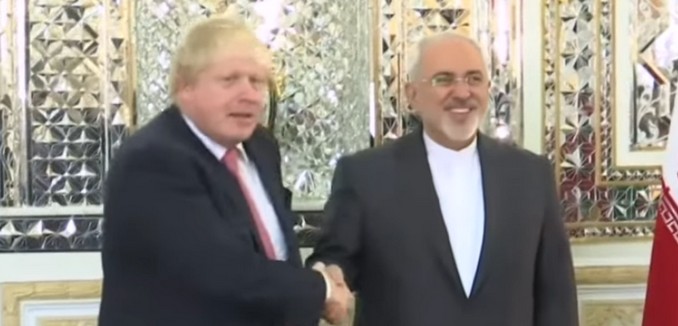Returning from a trip to the Middle East including a stop in Iran, British Foreign Secretary Boris Johnson said that it was “too early to be confident” that a British-Iranian dual citizen would be released by Iran before Christmas, even as evidence emerged that Iran is seeking what is effectively a ransom payment for her release.
Johnson told the House of Commons that he had spoken to Iranian officials about releasing Nazanin Zaghari-Ratcliffe, an employee of the Thompson-Reuters Foundation, who was separated from her toddler daughter in April of last year and arrested as she was preparing to leave Iran after visiting family there, The Independent reported Monday. She was subsequently sentenced to five years in prison for attempting to overthrow the government.
Addressing the case of Zaghari-Ratcliffe, Johnson told the MPs, “I urged their release on humanitarian grounds, where there is cause to do so.” He added that, “These are complex cases involving individuals considered by Iran to be their own citizens, and I do not wish to raise false hopes.” Still Johnson described his talks with Iranian officials on behalf of Zaghari-Ratcliffe as “worthwhile.”
Johnson’s failure to obtain Zaghari-Ratcliffe’s release comes at a time that Saeed Ghasseminejad, a research fellow at the Foundation for Defense of Democracies, noted that Iran’s military has an item in the budget for allocating $571 million, roughly the amount Iran claims that the UK owes to cover a canceled arms deal following the 1979 Islamic Revolution. Iran’s Ambassador to London Hamid Baeedinejad claims that the UK is planning to transfer the sum to Iran’s central bank in the coming days.
In circumstances similar to Zaghari-Ratcliffe’s, in January 2016, on the day the nuclear deal was implemented, the U.S. government paid $1.7 billion that Iran said it was owed due to a canceled arms deal at the same time Iran released five Americans it had arrested. Though the U.S. government denied it, an Iranian general claimed that the payment was ransom for the Americans taken hostage.
Richard Ratcliffe said last year that his wife, who had been arrested and separated from her toddler daughter as she prepared to leave Iran in April 2016, was being held as a “bargaining chip.”
In Why Does Iran Keep Taking American Hostages?, published in the September 2015 issue of The Tower Magazine, Iran expert Ali Alfoneh described the regime’s detainment of foreign and dual-nationals as “a perfectly normal procedure and political practice in the Islamic Republic. That has been the case since the first day of the revolution and continues until today.”
[Photo: The Telegraph / YouTube]




